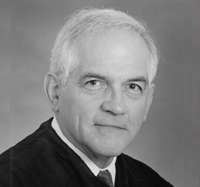James Robertson (judge)
| James Robertson | |
|---|---|
 | |
| Senior Judge of the United States District Court for the District of Columbia | |
|
In office December 31, 2008 – June 1, 2010 | |
| Judge of the United States District Court for the District of Columbia | |
|
In office October 11, 1994 – December 31, 2008 | |
| Appointed by | Bill Clinton |
| Preceded by | George Hughes Revercomb |
| Succeeded by | Robert L. Wilkins |
| Personal details | |
| Born |
1938 (age 77–78) Cleveland, Ohio, U.S. |
| Alma mater |
Princeton University George Washington University Law School |
James Robertson (born 1938) is a former United States federal judge who served on the United States District Court for the District of Columbia until his retirement in June 2010. He served on the Foreign Intelligence Surveillance Court from 2002 until he resigned in protest in December, 2005, later testifying that that court "has turned into something like an administrative agency."[1]
Born in Cleveland, Ohio, Robertson graduated from Western Reserve Academy in Hudson, Ohio, and received a B.A. from Princeton University in 1959. He served in the United States Navy from 1959 to 1964, achieving the rank of Lieutenant. He then received an LL.B. from George Washington University Law School in 1965, and was in private practice in Washington, D.C. from 1965 to 1969, with the law firm of Wilmer, Cutler & Pickering. From 1969 to 1972, Robertson served with the Lawyers' Committee for Civil Rights Under Law, as chief counsel of the Committee’s litigation offices in Jackson, Mississippi, and as director in Washington, D.C. Robertson then returned to private practice with Wilmer, Cutler & Pickering, where he practiced until his appointment to the federal bench. While in private practice, he served as president of the District of Columbia Bar, co-chair of the Lawyers’ Committee for Civil Rights Under Law, and president of Southern Africa Legal Services and Legal Education Project, Inc.[2]
Federal judicial service
On September 14, 1994, Robertson was nominated by President Bill Clinton to a seat on the United States District Court for the District of Columbia vacated by George H. Revercomb. Robertson was confirmed by the United States Senate on October 7, 1994, and received his commission on October 11, 1994. After serving for 14 years, he assumed senior status on the District Court on December 31, 2008 and retired on June 1, 2010.[3]
Chief Justice William Rehnquist placed Robertson on the Foreign Intelligence Surveillance Court on May 19, 2002. On December 20, 2005, Judge Robertson resigned from the FISA court, sending a letter to Chief Justice John G. Roberts announcing his resignation with no explanation.[4][5] His resignation was interpreted as a mute protest against the NSA warrantless surveillance (2001–07) that had occurred outside the FISA statute, a supposition that was confirmed in 2013 by his statement after testifying to the Privacy and Civil Liberties Oversight Board that he had "resigned in protest because the Bush administration was bypassing the court on warrantless wiretaps."[1][4]
Notable rulings
- Schroer v. Library of Congress - Is gender transition covered under sex discrimination protection? Quote from conclusion: "In refusing to hire Diane Schroer because her appearance and background did not comport with the decisionmaker’s sex stereotypes about how men and women should act and appear, and in response to Schroer's decision to transition, legally, culturally, and physically, from male to female, the Library of Congress violated Title VII's prohibition on sex discrimination."
- Hamdan v. Rumsfeld - Military trials of Guantanamo Bay detainment camp prisoners [6]
- U.S. v. Webster Hubbell - (1) Whether the 5th Amendment privilege against self-incrimination protects information previously recorded in voluntarily created documents that a defendant delivers to the government pursuant to an immunized act of production, and (2) whether a defendant's act producing ordinary business records constitutes a compelled testimonial communication solely because the government cannot identify the documents with reasonable particularity before they are produced? Upheld by the Supreme Court by a vote of 8-1.
- American Council of the Blind v. John W. Snow, Secretary of the Treasury et al. - The U.S. Treasury Department’s failure to design, produce and issue paper currency that is readily distinguishable to blind and visually impaired people violates federal law, since paper money effectively precludes them from meaningful access to U.S. currency. "Of the more than 180 countries that issue paper currency, only the United States prints bills that are identical in size and color in all their denominations," Robertson wrote.
- Civil Action 08-2254 (JR) - Case to potentially invalidate the candidacy of Barack Obama II due to the Issue of Nationalization and Citizenship. The case was dismissed, deemed frivolous, and all other forward cases were deemed frivolous due to a prior ruling.
References
- 1 2 "Former judge says secret FISA court is independent but 'needs an adversary'". Washington Post. July 9, 2013. Retrieved July 9, 2013.
- ↑ "Judge James Robertson, U.S. District Court, Washington DC". United States District Court. Archived from the original on June 9, 2010. Retrieved July 4, 2013.
- ↑ James Robertson at the Biographical Directory of Federal Judges, a public domain publication of the Federal Judicial Center.
- 1 2 Carol D. Leonnig and Dafna Linzer (December 21, 2005). "Spy Court Judge Quits In Protest". Washington Post. Archived from the original on December 21, 2005. Retrieved July 4, 2013.
- ↑ Richard Cummings (January 6, 2006). "Homage To Jimbo". Lew Rockwell.Com. Retrieved July 4, 2013.
- ↑ Ruling on lawfulness of Guantanamo proceedings [US DC] November 08, 2004 (summary) (full text PDF file)
| Legal offices | ||
|---|---|---|
| Preceded by George Hughes Revercomb |
Judge of the United States District Court for the District of Columbia 1994–2008 |
Succeeded by Robert L. Wilkins |